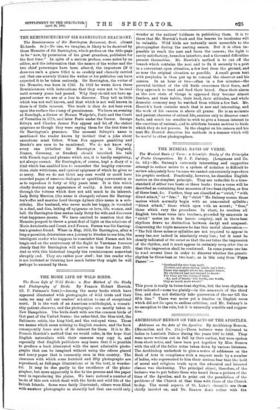THE MUSICAL BASIS OF VERSE.
The Musical Basis ef Verse : a Scientific Study of the Principles of Poetic Composition. By J. P. Dabney. (Longmans and Co. 6s. 6d.)—Mr. Dabney's extremely interesting and suggestive attempt to reduce metre to a system of notation is difficult to review adequately here because we cannot conveniently reproduce his graphic method. Practically, however, he classifies English metres on the simplest principle. They are reducible to a time- standard of either two beats or three beats : thus a verse will be described as containing four measures of two-beat rhythm, or five of three-beat, &c. Further, they are classified as "strict," "with direct attack," or "free." By " strict " Mr. Dabney means those metres which normally begin with an unaccented syllable ; "direct attack," those which open with an accent; "free," those which vary the procedure. In short, he resolves all English two-beat verse into trochees, preceded by anacrusis in "strict" metre (as in the heroic couplet), and in three-beat rhythms draws no distinction between dactyl and anapaest. Concerning the triple measure he has this useful observation :— " The full three notes or syllables are not required to appear in every bar, nor indeed in absolutely every line ; but it must be clearly indicated at the outset so that the ear takes the impression of the rhythm, and it must appear in certainly every other line so that this impression shall be continued. In some poems one has to read several lines in order to discover whether the generic rhythm be three-beat or two-beat; as in this song from Pippa Passes' :—
• Overhead the tree tops meet, Flowers and grass spring 'neath one's feet ; There was naught above me, naught below, My childhood had not learned to know ; For what are the voices of birds —Ay, and of beasts—but words, our words, Only so much more sweet?'
This poem is really in three-beat rhythm, but the true rhythm is first indicated—none too plainly—in the anitcrusis of the third line, and does not distinctly take possession of the ear till the fifth line." There was never yet a treatise on English verse which did not lie open to endless criticism, and Mr. Dabney's is no exception to the rule, but it is unusually sensible and sugges- tive.


























































 Previous page
Previous page